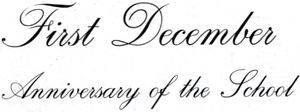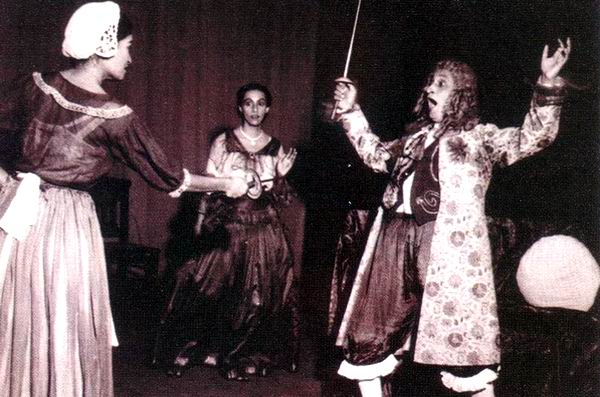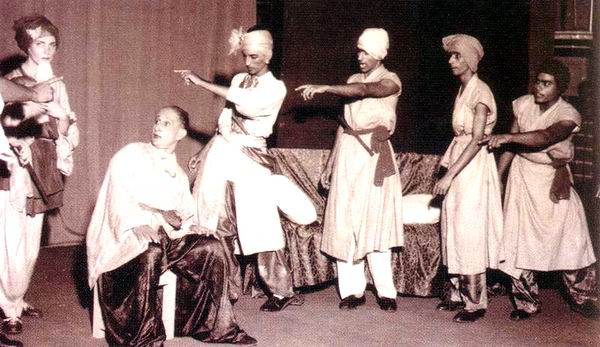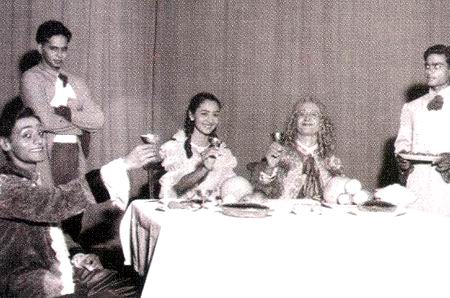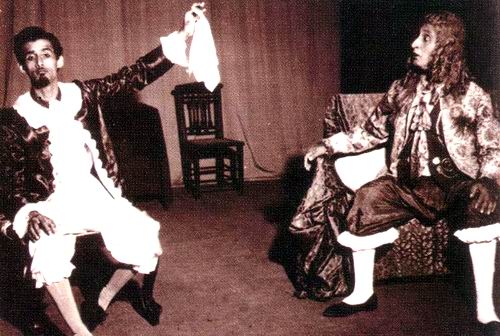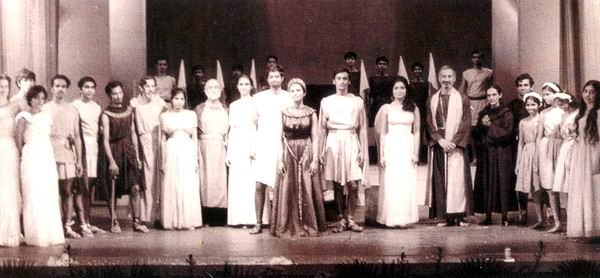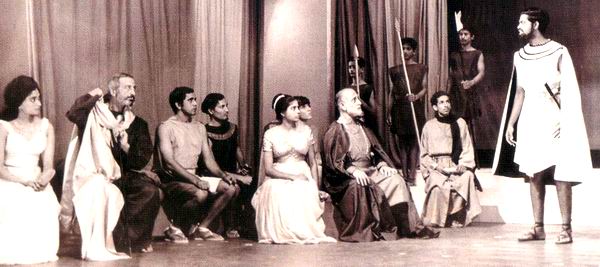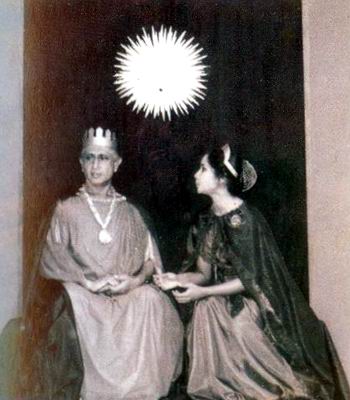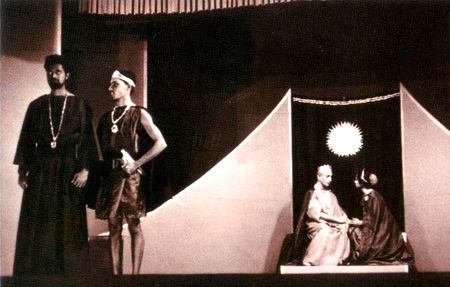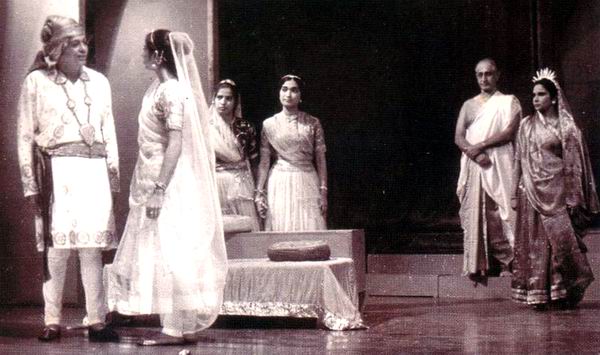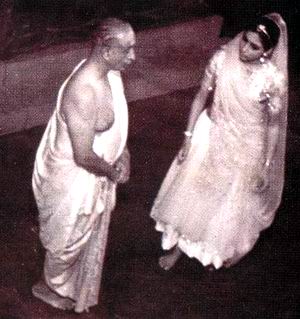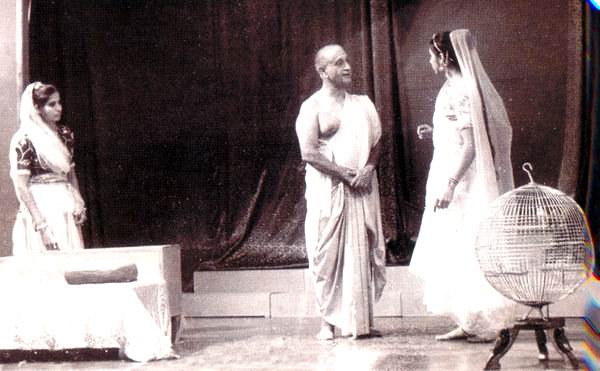Le Voyage de Monsieur Perrichon
A farcical 19th century comedy by Eugène Labiche about a retired manufacture who goes on a holiday to Switzerland with his wife and daughter, followed by two friendly suitors who devise stratagems to please the father and get the daughter's hand. |
The Mother and spectators at the 1st Dec. programme - playground |
|
Le Voyage de Monsieur Perrichon - 1st Dec. 1948 |
Le Voyage de Monsieur Perrichon - 1st Dec. 1948 M.Toussaint, Hriday, Mme Toussaint,Udar, Atindra, Amita |
Page - 66
|
Le Grand Secret - 1st Dec. 1954 Debu, Udar, André, Pavitra, Manoj, Hriday, Satprem |
Le Grand Secret - 1st Dec. 1954 Debu, Udar, André, Pavitra, Manoj, Hriday,
Satprem
A play by the Mother - 1st December 1954: Six monologues and a Conclusion. Six of the world's most famous men have been brought together, apparently by chance, in a life-boat in which they have taken refuge when the ship that was carrying them to a world conference on human progress sank in mid-ocean. There is also a seventh man in the boat... |
This comedy of Molièrés, written in 1672, makes fun of the intellectual cult of the day in the ridiculous figure of Trissotin who backs out of a proposed marriage to the charming daughter of his fashionable followers -a domineering woman and her hen-pecked husband - when he hears the rumour that the family has lost its fortune. |
Les Femmes Savantes Debdas, Jhumur, Promesse, Uadr, Andre, Arati, Srimayee, Amita, Chhanda |
Page - 67
|
Le Bourgeois Gentilhomme - 1959 Chhanda, Arati, Udar |
Le Bourgeois Gentilhomme - 1959 Srimoyee, Udar, Mukul, Brajkishor, Bhai, Prabhakar |
|
Le-Bourgeois Gentilhomme(1670) -July-1959. A comedy of Molière that is about a rich merchant who aspires to become a gentleman and hires tutors to acquire the superficial accomplishments of the 17th century Man of society. |
Le Bourgeois Gentilhomme - 1959 Gama, Amarendra, Jhumur, Udar, Prabhakar |
Le Bourgeois Gentilhomme - 1959 Manoj - the Philosopher; Udar - the gentilhomme |
Page - 68
|
The Viziers of Bassora - 1964 At the King's court Anjana, Promesse, Udar |
A Play by Sri Aurobindo - 3rd December 1964: The Play is a depiction of the conflict of good and evil
in which victory comes to the good.
The play has another theme, that is,
of love, though a minor one. Love
is presented by Sri Aurobindo, in
his play after play, as a benevolent force which destroys evil and conflict and paves the way for harmony
and peace.
The Viziers of Bassora - 1964 Udar as Emperor |
The Viziers of Bassora At the King's court - 1964 Ranajit, Mina, Kokila, Vishweshwar, Udar, krishna, Jules, behram.
In the play The Viziers of Bassora I was given the role of Shaikh Ibrahim, the sweet told drunkard. I was told that since I had no real experience of being drunk Udar would teach me the part. So I use to go in the evenings to his house and learn from him. One day he said that I should get drunk to truly understand how it felt. "Tomorrow I'll get you some wine and make you drunk," he said. i was very excited since I was young and eager to have this new experience. The next evening however, when I went to him, Udar told me sadly that he had asked Mother about getting me drunk but Her answer was a categorical "No!" He was sorry but could give me no wine. "Oh no!" I said to myself. - Promesse - |
Page - 69
|
Rodogune - 1968 Back: Datta, Klya, Padmakar, Norman, udar, Jhumur, Kanu, Debobrato, Kabul, Victor, Promesse Fornt:Ravi, Bhudutt, Subhash, Chitra, Amita, Chhanda, Gene, Arati, Gita, Maria, Kanaklata
Rodogune - 1968 Chhanda, Gene, Bhudutt, Subash, Chitra, Kalya, Udar, Bipin, Ashwin, Abhijit, Kanu |
Udar as Nicanor in Rodogune 1968
A Drama by Sri Aurobindo - 1st December 1968: A tragedy set in Antioch, the ancient capital of Syria. Rodogune, which underlines the purposiveness of suffering, is a parable of the working of Fate and also a celebration of the supremacy of love, its power and glory. |
Page - 70
|
Perseus the Deliverer - 1966 Chhanda, Svetlana, Behram, Udar, Amita |
A Drama by Sri Aurobindo - 1st December 1966: Here the stage is the human mind of all times: the subject is an incident in its passage from a semi-primitive temperament surviving in a fairly advanced outward civilisation to a brighter intellectualism and humanism - never quite safe against the resurgence of the dark or violent life-forces which are always there subdued or subordinated or somnolent in the make-up of civilised man - and the first promptings of the deeper and higher psychic and spiritual being which it is his ultimate destiny to become. |
Perseus the Deliverer - 1966 Portrait of the King |
|
When we were rehearsing the drama of Sri Aurobindo, Perseus the Deliverer, we all went to Her in our stage costumes to show them to Her. I was dressed as a King since the role I had was that of King Cepheus, the father of Andromeda. When the Mother saw me She exclaimed, "Ah, now I remember seeing you dressed like this, one of the times we were together in a previous life. You were then a Roman Emperor." She did not specify which one and I was too thrilled to ask Her and the moment passed. -Udar- |
Page - 71
|
The Prince of Edur - 1970 Prem malik, Kirti, Chitra, Chhanda, Udar, Shobha |
A play by Sri Aurobindo - 1970: Written in 1907, incomplete. Historically, Bappa the hero of the play was the founder of the great- ness of Mewar. He had spent his childhood among the Bheels (Bhils) of the forest, become their chieftain, and ultimately founded a kingdom around Chitor. In Sri Aurobindo's play, Bappa of the Bheels - who is really the Prince of Edur in exile - manages to thwart the designs of all his enemies including the usurper, Rana of Edur, and marries his daughter as well. The clash of interests and the heady march of events make for dramatic excitement, but Sri Aurobindo seems also to have visualised Bappa in the prototypical image of patriot and deliverer, a fiery son of the Mother issuing from his 'Bhavani Mandir' in the hills to cause confusion among the enemies of the country. - K.R. Srinivas lyengar- ('Sri Aurobindo' 2006 ed. p. 154) |
|
The Prince of Edur - 1970 Udar, Kirti |
The Prince of Edur - 1970 Chitra, Udar, Kirti |
Page - 72
